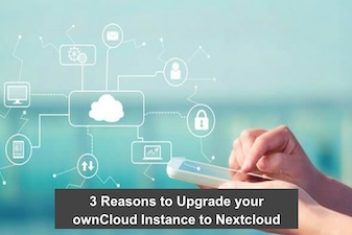Due to the improved framework conditions, cloud storage is an interesting alternative to backing up data to an external hard drive or a network attached (NAS) .The falling prices in data transmission and storage media have made cloud storage attractive and functional. With only minimal investments, your data can be reached anywhere on any device.
In addition to the provider’s servers, the most important component of the cloud backup is the client which helps you synchronize the data between your devices and the cloud space and also lets you choose which data and directories should be transferred to the cloud. As soon as you change something on a computer that is connected to the cloud via the client, the data is automatically transferred to the cloud.
If you use cloud storage with a synchronized drive, the data on all other devices are also adapted. This means that you always have the current status of a file or folder on all connected computers, smartphones, and tablets.
Read: The Cloud and Telehealth Can Coexist Safely
Some cloud storage providers offer their services with additional features such as editing documents online in the browser, sometimes even in real time with several parallel users. Other providers in turn offer exciting photo management functions in online storage
It makes perfect sense to use a cloud Office service in addition to cloud storage. Because you not only have photos and other files with you everywhere, but also important documents. These can be edited and shared online with others.
Cloud storage security issues
Cloud security is paramount. Your data is more secure than on your hard drive because backup solution providers typically take a variety of security measures to avoid problems. Features such as 2FA provide additional protection, which prevents your data from being accessed by coupling the login to another factor.
Read: How Do Cloud Computing Services Benefit Businesses
Private key encryption also ensures that your data is encrypted locally before it is sent to the provider’s server. As a result, administrators on the provider side also have no access to your data.
This is said, there are several scenarios that should be taken into account though if you do not use 2FA or private key encryption:
- Someone steals your access data and can therefore access your data without further restrictions.
- Your provider’s server is hacked and the attacker can access the stored data.
- The administrator of your provider does not take your privacy very seriously and accesses the stored data.
- Ransomware attack : One of the biggest sources of danger besides data loss due to hardware failure and theft is a ransomware attack . In this case, the data is encrypted and is therefore unusable until you pay the ransom. Even then, however, it is not certain that you can really recover all of the data. That is why a functioning backup solution is of central importance for such cases. This should allow a backup at a certain point in time before the ransomware attack – this way, your data can be restored in any case without much effort and, above all, without paying the ransom.
Most solutions allow you to either do a full restore or alternatively a partial restore of individual directories or even individual files.
You also have the indirect option of backing up a synchronization folder. Using versioning, you can restore the status of a file at a certain point in time in most solutions.
The providers are of course aware of these cloud storage security risks and have implemented various security functions to better protect your data.
Read: Free cloud backup service cBackupper Review
Despite special precautions, it can happen that an attacker gains access to your data. That is why it is particularly important to use two-factor authentication when saving to the cloud.
The protection of your data on the server is usually guaranteed by encrypting the data stored there. With this protective measure, a hacker who has gained access to the server sees at most the file names, but not the stored content. If the service uses private key encryption, even an administrator can no longer read your data.
Read: Best cloud storage services for 2020
With private key encryption , the key always remains on your computer. Your data is encrypted before it is sent to the server. In the opposite case, decryption takes place only when the data has reached your computer.
Collaborative work on the cloud
In addition to backing up data, cloud storage is also an option for conveniently working on a file with several people or sharing a folder together. Many of the providers allow you to share a file or folder to work with. Depending on the solution, you can set different access rights for the release: from simple reading to complete editing.
Private or business use
A central decision criterion for the right service is also the type of use : private cloud storage or business cloud storage . This usually goes hand in hand with the number of computers and the administration of the backups.
For private use, you usually back up several devices, but they all belong to the same owner or at least to the members of a family. At this point, there are not so great requirements in terms of delimitation of the data and administration console.
It looks different if you act as a self-employed person or if you are also responsible for data backup of a small company. In such a case, you need to have the right tools at your disposal to get an overview of the status of the backups of the individual devices at any time. It should also be possible to quickly and easily restore the content from a central location.
Read: Cloud Security Posture Management: All Information You Need to Know
On the one hand, this saves you the expensive on-site backup environment and is quickly operational again even in the event of a ransomware attack.
Cloud storage therefore offers maximum flexibility: from simple provision of data to active collaboration – everything is possible, depending on the service.
Do you need to pay for a cloud storage service?
In most cases, more data in the cloud means more advantages: On the computer, synchronization of all relevant data, for example, leads to the end of the need for manual backups on USB sticks, hard drives and the like, and storage bottlenecks on smartphones and tablets. In addition, all synchronized content is always conveniently accessible from any device.
Anyone who uses cloud services in the form described will soon reach the capacity limit of free offers. Some providers activate extended functions in the premium subscription. A corresponding investment can be absolutely worth it, depending on your own requirements.
Read: CIEM Tools: 7 Different Uses for Your Requirements
Such a subscription is by no means compulsory. Anyone who limits synchronization to office documents, for example, can easily manage with the usual five gigabytes of free storage space – and also enjoys the convenient synchronization of text files, presentations and more functionalities between work computer and home PC.
Subscription costs
After you have found the right service that meets your requirements in terms of scope of services, location and security, the last step is about the costs. Various factors play a role here: the two most important are the number of devices you want to back up and the storage space you need for your data backups.
Read: How to recover deleted files on linux: an Exhaustive list of tools
Another factor that plays a role with the providers is the contract term. The longer a contract runs, the higher the possible discount. Despite everything, you should test the service intensively in the first step before deciding on a longer runtime.
Most services offer you either a free trial period or a right of withdrawal in the early weeks of the contract. Use this option to determine the best provider for you.
If you like the content, we would appreciate your support by buying us a coffee. Thank you so much for your visit and support.



